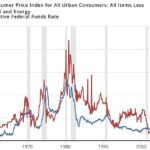Unlocking the potential of your investment in a shifting financial landscape
- Investing $50,000 with a high risk tolerance can be strategic in a changing interest rate environment.
- Consider a diversified portfolio including equities, small-cap stocks, and REITs.
- Dollar-cost averaging can help manage market volatility.
- Lower interest rates may benefit small-cap companies and certain sectors like real estate.
- Locking in longer-duration bonds now could be advantageous before rates fall.
If you’re 38 and looking to invest $50,000 with a high risk tolerance, now is a pivotal time to consider your options. With the Federal Reserve expected to cut interest rates soon, the investment landscape is changing. While you may be eager to dive into the stock market, it’s essential to approach this with a strategy. nnYou have a variety of investment opportunities available. Although your risk tolerance is high, it’s wise not to put all your money into high-risk stocks. Instead, think about a balanced approach. Given your age, you have the advantage of time for long-term investments. nnThe Federal Reserve’s recent interest rate hikes have created a unique environment. Historically, rate cuts tend to boost the stock market, especially for small-cap companies that are more sensitive to borrowing costs. Consider allocating a portion of your funds to equities, particularly in sectors that benefit from lower rates, such as utilities and small-cap stocks. nnTo manage market volatility, you might want to employ a dollar-cost averaging strategy. This means investing your $50,000 in smaller, equal amounts over time, which can help mitigate the impact of market fluctuations. nnOn the fixed-income side, locking in longer-duration bonds now could be a smart move before rates decline further. Look into 10-year Treasury bonds or municipal bonds, which can provide stability and potential price increases as rates fall. nnReal estate investment trusts (REITs) are also worth considering, as they offer higher yields compared to traditional bonds and provide liquidity, allowing easier access to your cash. nnAs you navigate this investment journey, remember that diversification is key, especially in uncertain economic times. By spreading your investments across various sectors and asset types, you can better position yourself for potential growth while managing risk effectively.·
Factuality Level: 7
Factuality Justification: The article provides a range of investment advice and insights based on current market conditions, which is relevant to the reader’s inquiry. However, it includes some repetitive information and could benefit from clearer organization. While it presents opinions from various financial experts, it does not clearly distinguish between fact and opinion, which may lead to some confusion for readers. Overall, it is informative but could be more concise and objective.·
Noise Level: 7
Noise Justification: The article provides a detailed analysis of investment strategies in the context of changing interest rates, which is relevant and informative for the reader. It discusses various investment options, including equities, bonds, and REITs, while also considering the implications of Federal Reserve actions. However, it lacks a deeper exploration of long-term trends and does not hold powerful entities accountable, which prevents it from achieving a higher score.·
Public Companies: Charles Schwab (SCHW), Fidelity Investments (), BlackRock ()
Private Companies: Hamilton Capital Partners,Janney Montgomery Scott,TwinFocus
Key People: Martin Schamis (Vice President and Head of Wealth Planning), Alonso Munoz (Chief Investment Officer), Paul Karger (Co-founder and Managing Partner), Denise Chisholm (Director of Quantitative Market Strategy), Rick Rieder (Chief Investment Officer of Global Fixed Income)
Financial Relevance: Yes
Financial Markets Impacted: The article discusses investment strategies and market conditions influenced by Federal Reserve interest rate changes, impacting stocks, bonds, and real estate investment trusts (REITs).
Financial Rating Justification: The article provides advice on investing in the stock market and discusses the implications of interest rate changes by the Federal Reserve, which are critical factors affecting financial markets and investment decisions.·
Presence Of Extreme Event: No
Nature Of Extreme Event: No
Impact Rating Of The Extreme Event: No
Extreme Rating Justification: The article discusses investment strategies and market conditions but does not report on any extreme event that occurred in the last 48 hours.·
Move Size: No market move size mentioned.
Sector: All
Direction: Up
Magnitude: Medium
Affected Instruments: Stocks, Bonds, REITs
 www.marketwatch.com
www.marketwatch.com 




